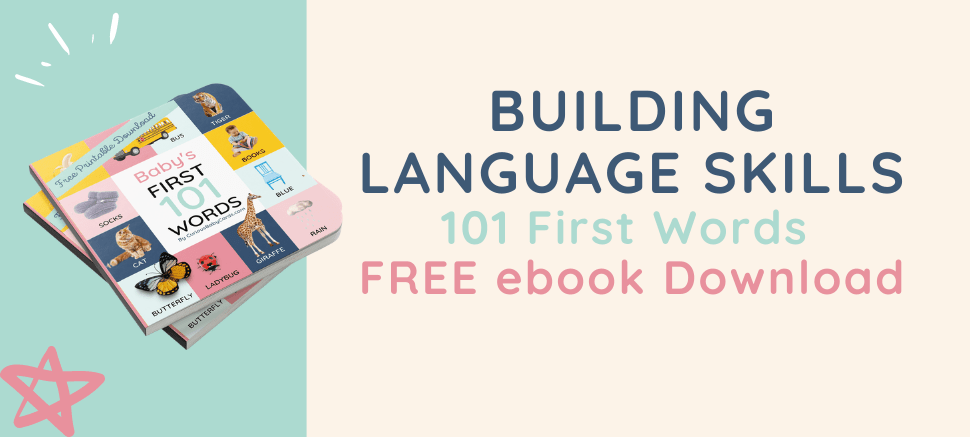If you talk to parents of young children, you’ll likely hear that becoming a parent is one of the most rewarding, yet also most challenging parts of their life thus far. Learning how to shift from taking care of yourself, to taking care of another tiny human is a lot to figure out and can be overwhelming at times. And it’s not enough to keep these little monsters alive, we’re also tasked with helping them grow!
As parents, we're also responsible for teaching them about our world, to develop their curious minds, and help them become kind, empathetic human beings. It’s a lot, we know. We're parents too.
And we’re here to help. That’s why we’re giving you our free PDF download version of 101 First Words. Yes, really FREE. That's because we can all use a little help to make life with young kids easier. So here you go!
Yours to keep, (and share!)
There are so many important aspects of raising an infant or toddler that costs parents both time and money, but to be different, we’ve created a free resource that you can download to help make spending time with your little one a little bit easier.
We’re super excited to share our FREE e-book of 101 First Words.
Feel free to download, print, and share with friends and use this resource as a tool to help build your child’s vocabulary together at home, or with their caregivers, friends and family.
Why is language development important?
Language development is a critical step in an infant’s cognitive development and it is widely impacted by their environment. Beginning at birth, a baby is constantly listening to the language they hear around them, and the more they are exposed to words and language, the more opportunities it gives them to practice.
You can never read too much to an infant, and the earlier you start, the more of a head start they have. It’s also one of the reasons that we include an activity for “Reading Time,” in our Curious Baby Activity Set.
It starts at birth
Infant communication starts from day one. When they are just hours old, babies communicate with us through grunts and cries. They tell us if they are hungry or in pain or even if they are uncomfortable. We know these sounds as the very first things we hear after birth and its innate.
However, as they grow, their eye-sight begins to improve and soon they will begin to look up at their parents and/or caregivers' faces and begin to try out your expressions. You may be surprised how quickly your baby may mimic simple facial reactions such as sticking out your tongue and smiling!
How does an infant's vocabulary develop?
Around ages 2-3 months, your baby may begin to make some cooing sounds to communicate pleasure, surprise or excitement. And by 3-4 months, they will start to add more verbal sounds to the mix. You may hear things like “gaga” around 4-6 months coming from your baby as they experiment with mixing sounds.
“By age 5 months, babies are learning the musical sound and speech patterns of their caregiver's native language, which is the language they hear the most. As they continue to practice making sounds, they will begin imitating their first sound patterns.” Source 1
Over the next few months, your baby may be using non-verbal cues to communicate as well. Many parents and caregivers choose to try and teach some basic sign-language to help their baby describe their needs and wants before they can talk. Sign language can make events like mealtimes go a lot smoother for both of you, and it's also we've included a few of the easiest signs in our Curious Baby Activity Set).
“Around age 6 months, they begin to babble. This allows them to connect consonant sounds with vowel sounds in ways that are used in their native language to make distinguishable syllables. Babbling allows children to imitate the sentence length, intonation, and rhythm of adult speech as they begin to learn how to form verbal thoughts.”
And near the 9-12 month mark, your baby will begin to put together everything that they’ve observed and heard thus far to lead up to their first “real” words, such as “mama” or “dada”. How exciting, right?
And for those parents who want to campaign for one or the other as their first word, we recommend reading the Tonight Show Host Jimmy Fallon’s “MAMA” and “DADA” for a good laugh :).
Research benefits of Reading to Children
Children learn language before they understand that words have a meaning at all. When you read books to them, not only are their brains developing, but they are beginning to build social skills as well through the sights and sounds that you produce. From the intonation in your voice, to the expressions that you make, to pointing and touching the pages, it all works together to help your baby build their emotional awareness and cognitive ability.
“One study found that kindergarten children who were read to at least three times a week had a “significantly greater phonemic awareness than did children who were read to less often.” And the landmark Becoming a Nation of Readers report from 1985 concluded that “the single most important activity for building knowledge for their eventual success in reading is reading aloud to children.” Source 2
→ Download our 101 First Words e-book
Enter your email in the box below and you’ll automatically get a copy of the e-book delivered right to your inbox.
Don’t worry, we won’t spam you. In fact, we hardly ever send out any emails more than once a month because who has time to do that with little kids running around at home? 😂
Let us know what you think
We’re on a mission to provide simple, accessible and fun developmental activities to parents and caregivers—and we thank you for letting us play a part in your child’s growth.
We hope you enjoyed this free resource to help build your child’s vocabulary skills. If you enjoyed using it, please leave us a note in the comments below. And if you have any other ideas for resources we can build for you, send us a note anytime at hello@curiousbabycards.com.
1 https://www.gulfbend.org/poc/view_doc.php?type=doc&id=10114&cn=28
2 https://www.pbs.org/parents/thrive/why-reading-aloud-to-kids-helps-them-thrive
There's more too
If you enjoyed this free 101 First Words Download, there’s tons more where they came from. Grab your own copy of infant language development cards that you can do at home with your baby from birth to 12 months.
Please note: Articles on our blog may contain Amazon affiliate links. Purchasing directly from these referral links helps support the Curious Baby Blog and costs nothing to you!









1 comment
I really interested in this book and want to read it
Leave a comment